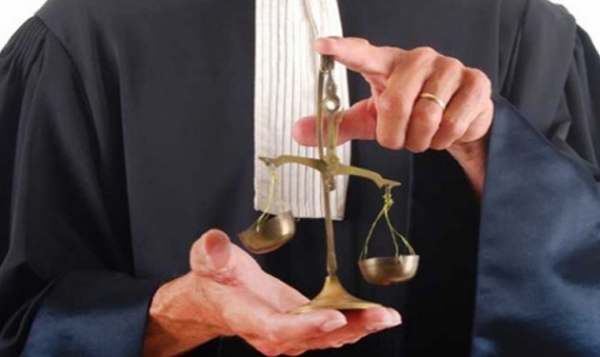Anwar El-Khatib (1910-1970)-A sorely missed jurist
Birth
Anwar El-Khatib was born in Chehim, a town in the Qada’a of Shouf, in 1910. He was the son of MP Ahmad El-Khatib who was elected in 1937.
Education
Anwar El-Khatib received his early education in Chehim before moving to Beirut where he pursued secondary education and obtained his baccalaureate from the Patriarchate School in 1928. He enrolled afterwards as a law student at the Université Saint Joseph and graduated in 1940.
Career
Anwar El-Khatib began his career as a journalist at the newspaper al-Ahd al-Jadid (The New Era). He was appointed a judicial assistant while still a student at the Law Faculty. Later in 1943, he joined the judicial corps and was appointed an investigator in Tripoli. He had several judicial positions, the last of which was President of the Court of Cassation in Beqa’a in 1950. He resigned from his post one year later in order to focus on the practice of law after becoming involved in politics.
Partisan activism
In 1950, Anwar El-Khatib joined with Kamal Jumblatt and a number of intellectuals and jurists such as Edmond Nouaim, the President of the Bar Association Fouad Rizk, René Nammour and Maurice Sakr, in founding the Progressive Socialist Party and was elected its deputy president.
Deputyship
His engagement in the Progressive Socialist Party and close relationship with Kamal Jumblatt propelled him into running for Parliament. He won the Sunni seat in the Shouf district under the Jumblatt-Erslan-Chamoun list in the 1951 parliamentary elections. El-Khatib obtained 11,693 votes out of 24,004 against 11,488 for Hussein El-Jisr, his nearest rival under the list backed by Bechara El-Khoury, i.e. a margin of 105 votes only. The electoral battle was ferocious and marked by tight results among both winners and losers. The former list won in its entirety, except for Aziz Aoun (Maronite) who was defeated by the head of the rival list MP Salim Khoury.
Although he was defeated at the 1953 elections, Anwar El-Khatib won once again in 1957. In 1960, he lost by 264 votes against his rival and fellow countryman Qabalan Qabalan. Qabalan died on March 17, 1963, two days after the death of Emile Boustany, which necessitated the holding of by-elections in the Shouf area to fill the seat that had fallen vacant. The elections resulted in the uncontested victory of Myrna Boustani, daughter of Emile, while Anwar El-Khatib defeated his rival Ahmad Berjawi by 12,239 votes to 5338.
In the 1964 elections, El-Khatib ran once again under Jumblatt’s list and defeated his rival from Chamoun’s list, Ahmad Hajjar, by 19,073 votes to 18,314.
In 1968, the electoral battle was at its peak between Kamal Jumblatt and Camille Chamoun who formed two rival lists to run for elections. Anwar El-Khatib won one of the two Sunni seats under Jumblatt’s list garnering 22,914 votes while his colleague Mohammad Berjawi lost after obtaining 21,859 votes. From the rival list, Issam El-Hajjar won by 23,253 votes; his colleague Hassan Qaaqour amassed 22,294 votes, i.e. 620 votes less than El-Khatib who did not live long enough to complete his term of office. El-Khatib died on November 14, 1970 and by-elections were held on December 10, 1970 resulting in the victory of his son, Zaher El-Khatib, who defeated his Chamoun-backed rival, Hassam Qaaqour, by 22,075 votes to 18,148.
Ministry
Anwar El-Khatib’s arrival to Parliament enabled him to enter the ministry as well, backed by Kamal Jumblatt. He was one of the few Sunni personalities in Shouf to assume ministerial positions. On February 8, 1968, he was appointed Minister of Water and Electrical Resources during the presidential era of Charles Helo, under the government headed by Abdullah Yafi. He remained in this position until the government’s resignation on October 12, 1968. He held the same ministry as well as the Ministry of Agriculture in the next government formed by Yafi, which only survived eight days. Under Rashid Karami’s government, he assumed the same portfolio and remained in office from November 25, 1969 until the resignation of the government on October 13, 1970.
Works
Anwar El-Khatib left his mark in both Parliament and several ministries and contributed to several regulations and legislations. He was well known for the speeches he gave in Parliament which revolved around rightful political and social demands.
During his life time, Anwar El-Khatib wrote a huge collection of legal and juristic works, which have become a point of reference in several subjects, including:
Marriage under the Islamic sharia’a and the Lebanese laws
Parliamentary fundamentals in Lebanon and the rest of Arab countries
The socialist propensity in Islam
Lebanon’s constitution
General principles under the law
State and the political systems
Anwar El-Khatib has been quoted as saying:
“Lebanon needs a revolution to liberate the country from several yokes gnawing at its very existence.
“Independence is a decent attempt to spread social justice and prevent the violence caused by social inequalities.”
Family
He married his relative Hekmat El-Khatib and had six children with her.
Death
He died on November 14, 1970 at the age of 60.








Leave A Comment